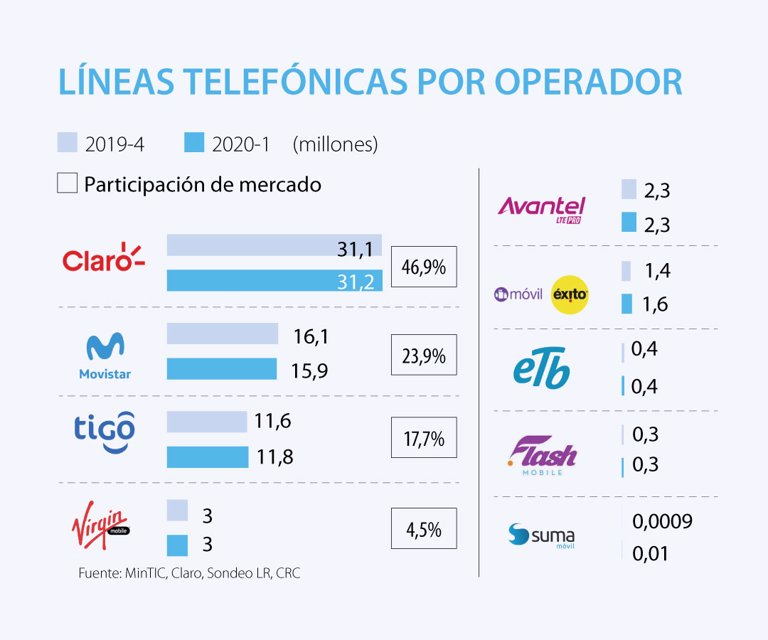
[ad_1]
Laura Neira Marciales – [email protected]
The Communications Regulation Commission and the Ministry of Information Technologies and Communications have a pending issue with the operators since 2016: defining whether or not Claro has a dominant position in the mobile services market.
For this reason, 27 companies in the telecommunications sector joined together to write a letter to the Organization for Economic Cooperation and Development, in order to make an appeal to the Government and complete the process that was paused after the approval of the Law ICT with which the CRC became a convergent regulator.
Juan Carlos Archila, president of América Móvil, affirmed that with this letter “they want to pressure the Government so that the decision benefits them and not the country, because that in the end discourages the investment we make in the country.”
In the document, the companies highlight that a year after the publication of an OECD report in which it was said that there was a high concentration in the telecommunications market, “59% of the total sector income is received by Claro (Report MinTIC 2020), which leaves the remaining operators with low profit margins, putting future sustainability at risk, which further affects small companies in the market ”.
However, Archila explained that Claro invests 15% of the income, which has represented about US $ 900 million per year, in the last five years. “The others invest 18% of their income, which is about $ 150 million each and even among the 27 competitors, they do not exceed what we invest.”
In addition, he assured that Colombia is a competitive market, and that the government has given users the tools to choose the service that best suits their needs, therefore, “in the last 10 years we have lost 20 participation points , users have been informed and have chosen among the 12 operators that currently exist. Let’s remember that in 2013 we were only three service providers, ”added Archila.
Another of the disputes in the sector has been the debt of Avantel and its merger with Partners, since the operator owes Claro, Tigo and Movistar more than $ 149,000 million for the use of their networks through National Automatic Roaming, a service that Operators lend themselves to provide coverage to their users in places where they do not have infrastructure.
To this is added the stumbled entry of Partners into the country, since it must be remembered that after the spectrum auction they retracted one of the blocks they had acquired, assuring that they had made a mistake when making the offer.
Marcelo Cataldo, president of Tigo, explained that “Avantel currently has three open investigations, two in the CRC and one in the Ministry of ICT, in addition, it did not meet the requirements to enter the reorganization process.”
The most recent mess is the investigation of the National Spectrum Agency, which will initiate the evidentiary stage, for the unauthorized use of the spectrum assigned to Partners by the MinTIC.
The other investigation dates from February 3, when the ANE ordered the operator to stop using the spectrum that had been given to it until December 31;
For its part, in the MinTIC process, it is being validated if the operator complied with the infrastructure deployment that it committed to in the 2013 auction.
Fewer competitors in the market
Colombia has been classified as an atypical market by Jorge Negrete, director of Mediatelecom Policy & Law, as there is a worldwide trend to reduce the number of competitors in the telecommunications sector, but there are more and more in the country.
“In Mexico there will be two mobile operators, for 130 million Mexicans; The United States has just had three operators for 400 million people; and China will announce that of three operators it will keep two and we are talking about 1.3 billion Chinese ”, he explained.